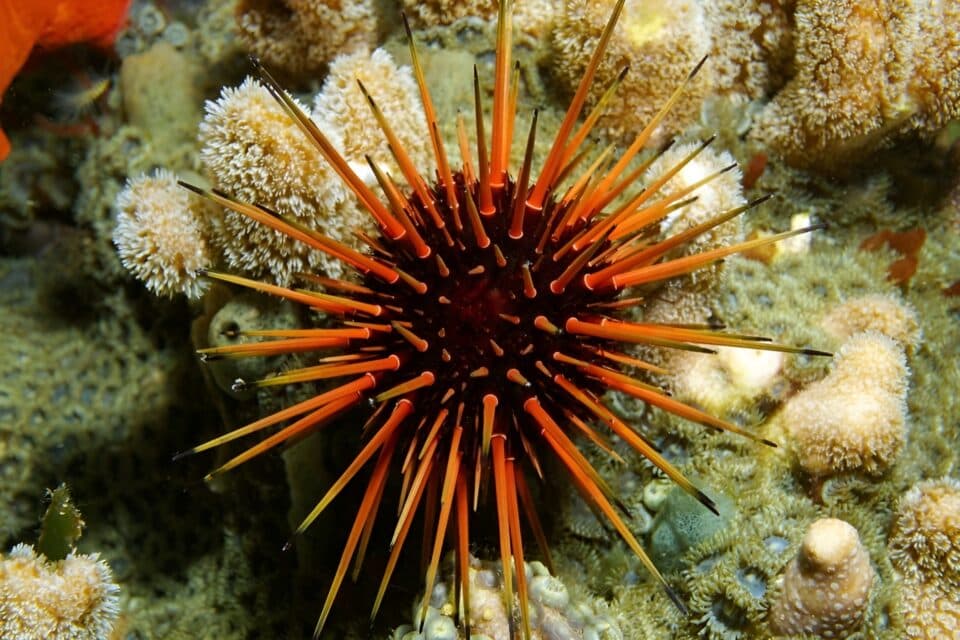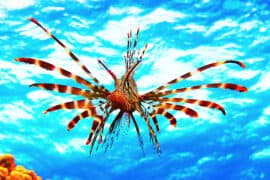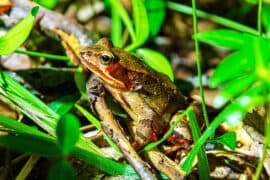
Deadly sea urchin parasite has emerged on opposite sides of the globe
In alarming news for the world’s coral reefs, a microscopic parasite responsible for recent catastrophic die-offs of sea urchins in the Caribbean has now appeared in the Sea of Oman on the opposite side of the world.
Recently, University of South Florida (USF) researchers have made this concerning discovery. Sea urchins are crucial to reef health as they consume algae, keeping it from smothering precious corals. This newly discovered global spread of a sea urchin disease is a significant threat to reef systems that are already fragile due to multiple stressors.
Sea urchin significance
Picture a coral reef with its vibrant colors and diverse life. Though beautiful, there’s constant competition happening out of sight. Fast-growing algae, if left unchecked, could smother corals, stealing their sunlight and nutrients.
Sea urchins are an important line of defense. They munch on algae, ensuring that corals have the space and resources needed to thrive.
Ciliate parasite harming sea urchins
The latest threat to sea urchins is surprisingly tiny: a single-celled pathogen called a ciliate. These microscopic parasites cause a devastating disease that wipes out entire sea urchin populations. “We’re tracking, almost in real time, the transglobal spread of a devastating marine disease,” said Professor Mya Breitbart.
Unfortunately, this ciliate is becoming an all-too-familiar foe. In 2022, it devastated populations of long-spined sea urchins in the Caribbean. Now, chillingly, it has surfaced over 7,000 miles away in the Sea of Oman, demonstrating its alarming ability to spread across vast distances.
Parasite’s deadly journey to sea urchins
The USF researchers were contacted by colleagues in Oman observing a mass die-off of a different species of sea urchin in the Sea of Oman. Samples were sent, and the unthinkable was confirmed – the very same killer ciliate was at work. The disease had somehow leaped from the Caribbean to the other side of the world.
This discovery sparked a series of urgent studies. “Not only were we able to determine that the ciliate was present in the samples from Oman, but we were able to purchase live specimens through the aquarium trade and demonstrate that they die when exposed to the ciliate,” explained Isabella Ritchie, a USF graduate student.
Even more shocking was that some of the urchins purchased for the study were already infected with the parasite when they arrived at the lab. It’s a troubling indicator of how aquarium trade practices, if not carefully monitored, could potentially contribute to the spread of such diseases.
A global emergency
Questions still swirl around how exactly the parasite traveled halfway across the world to harm sea urchins. Scientists are investigating possibilities— international shipping, contaminated dive gear, or the aquarium trade are all suspects. One thing is certain: the species of sea urchin currently under attack is widespread, inhabiting reefs from the Mediterranean to Japan.
Given how quickly the disease decimated Caribbean populations, scientists worry that a Pacific Ocean outbreak could be next.
Future directions
This story isn’t over. It’s a wake-up call highlighting the fragile interconnectedness of our oceans and the threats posed by diseases hitchhiking across the globe.
The dedicated scientists at USF and their partners are relentlessly working to learn more about this disease and, hopefully, find ways to protect our prickly reef guardians.
What you can do
News about microscopic parasites harming our oceans and the sea urchins that safeguard coral reefs can feel overwhelming. But you’re not powerless. Here’s how you can take action and be part of the solution:
Travel with care
If you love diving or snorkeling, protect the reefs you explore. Cleaning and disinfecting your gear between dives is a small step with a big impact, stopping the spread of diseases that endanger precious underwater worlds.
Make ethical aquarium choices
Support aquariums and suppliers that prioritize healthy, sustainable practices. By choosing responsibly sourced fish and corals, you fuel an industry that values ocean conservation and helps prevent disease outbreaks.
The power of your voice
Talk to friends and family about the importance of coral reefs and the sea urchins that protect them. Share the threats they face and the small actions that make a difference. Your passion can inspire others, creating a wave of change for our oceans.
These actions might seem small, but they aren’t. Together, they build a movement for ocean protection. The sea urchins’ struggles remind us that every creature, big and small, is crucial for the ocean’s health. We all have the potential to be champions for the oceans.
The study is published in The ISME Journal.
—–
Like what you read? Subscribe to our newsletter for engaging articles, exclusive content, and the latest updates.
Check us out on EarthSnap, a free app brought to you by Eric Ralls and Earth.com.
—–












